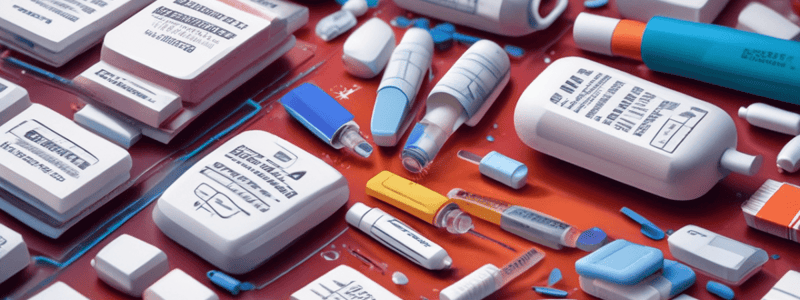Podcast
Questions and Answers
What basic skill is required for EMTs and AEMTs to calculate appropriate medication doses and flow rates?
What basic skill is required for EMTs and AEMTs to calculate appropriate medication doses and flow rates?
- Understanding drug indications
- Advanced life support procedures
- Basic math skills (correct)
- Obtaining orders from medical control
What is an important responsibility of Advanced EMTs related to drug orders before administration?
What is an important responsibility of Advanced EMTs related to drug orders before administration?
- Educating patients on medication
- Understanding therapeutic effects
- Documenting patient responses
- Confirming patient identity (correct)
What is required for IV therapy, making it crucial for EMTs and AEMTs to have proficiency and training?
What is required for IV therapy, making it crucial for EMTs and AEMTs to have proficiency and training?
- Basic math skills
- Invasive procedures (correct)
- Understanding adverse reactions
- Carrying drug boxes
Which aspect of medication administration is governed by local protocols and medical direction?
Which aspect of medication administration is governed by local protocols and medical direction?
What is crucial after administering medication to a patient according to the text?
What is crucial after administering medication to a patient according to the text?
What are the various rights of medication administration that Advanced EMTs need to confirm before giving drugs?
What are the various rights of medication administration that Advanced EMTs need to confirm before giving drugs?
Flashcards are hidden until you start studying
Study Notes
- Before administering medication, it is crucial to understand its mechanism of action, indications, contraindications, routes of administration, dose, adverse reactions, and how to manage adverse reactions.
- IV therapy is an invasive procedure that requires proficiency and training for EMTs and AEMTs, especially for advanced life support procedures.
- Pharmacology and medication administration require basic math skills to calculate appropriate medication doses, flow rates, and avoid adverse reactions.
- Medication administration in EMS is governed by local protocols and medical direction, which may include carrying drug boxes with various medications specific to the service.
- Advanced EMTs have responsibilities associated with drug orders, including confirming the rights of medication administration such as patient, medication, dose, route, time, education, refusal, response and evaluation, and documentation.
- The process for medication administration involves obtaining orders from medical control, understanding indications, contraindications, therapeutic effects, side effects, appropriate doses, and intervals for repeated doses.
- After administering medication, it is essential to dispose of syringes and needles safely, monitor for adverse side effects, and document actions and patient responses in the patient care report.
Studying That Suits You
Use AI to generate personalized quizzes and flashcards to suit your learning preferences.




